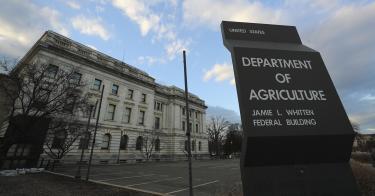A little-known slush fund at the U.S. Department of Agriculture has become a go-to funding source for billions of dollars of abusive spending in the last few administrations, Democrat and Republican alike. Currently, the Biden administration is improperly using it to help carry out its climate agenda.
The 90-year-old program, called the Commodity Credit Corporation, is an annual $30 billion funding mechanism for various farm bill programs like price support and conservation programs.
Among the problems with the Commodity Credit Corporation is the excessive discretion that the secretary of agriculture has in spending any undesignated money, which can be around $15 billion in a typical year.
Any spending restraint first began to crumble during the Obama administration. Congress rightly responded from 2012-2017 by restricting the use of that discretionary authority through policy riders in spending bills.
Unfortunately, the spending abuse increased during the Trump administration. In 2018 and 2019, the administration used the discretionary power to spend $28 billion in “trade aid” for farmers to offset the effect of retaliatory tariffs other nations imposed on U.S. goods that they imported.
At the same time, Congress dropped the longstanding restrictions on the spending. This set a terrible precedent, giving a green light for administrations to use the money as a slush fund to spend billions of dollars as they deem fit.
Sure enough, the Biden administration is now using the funding source to spend $3.1 billion to push dubious “climate-smart” agricultural practices through a program it created out of whole cloth called “Partnerships for Climate-Smart Commodities.”
Tyson Foods alone received a cool $152 million from the program. This is likely just the start of much greater climate spending by the administration from the slush fund.
Even with the Commodity Credit Corporation’s broad discretion, the Biden administration doesn’t have authority for this climate program. Regarding environmental programs, the Commodity Credit Corporation Charter Act expressly states that the funds can only be used to “[c]arry out conservation or environmental programs authorized by law.” The climate program hasn’t been authorized by law.
So, how has the administration justified spending billions without explicit authorization? It hasn’t even bothered to address it.
Instead, the Biden administration is pretending as if the environmental language doesn’t exist and is pointing to a “marketing” provision within the law as its authority. It is alleging that the program is just a way to market “climate-smart commodities.” This marketing justification doesn’t change the fact that it’s fundamentally an environmental program and must be authorized by Congress.
Even if there was proper authorization, no administration should have such broad discretion to effectively spend money at its whim. Such a system, where money can be handed out to favored interests with little to no oversight, is ripe for abuse and corruption. It’s also a way for the executive branch to implement policies that it couldn’t get adopted through the legislative process, including through the farm bill.
This slush fund also has major separation of powers problems. Under the U.S. Constitution, Congress has the spending power, not the executive branch. The sweeping spending authority under the Commodity Credit Corporation Charter Act arguably amounts to Congress delegating its constitutional spending power to the Department of Agriculture.
It might be difficult to completely put this spending genie back into the bottle. However, Congress can rein in abuses through policy riders in spending bills, which it did for many years.
Ending this abuse isn’t a partisan issue, nor is it about any specific use of the funds. It’s simply a way to ensure that Congress properly does its job and represents the voice of the American people on spending matters.
The Department of Agriculture, no matter which party is in charge, shouldn’t be able to create major new programs and spend billions of taxpayer dollars without proper authorization from those who have the power of the purse.
This piece originally appeared in The Daily Signal



